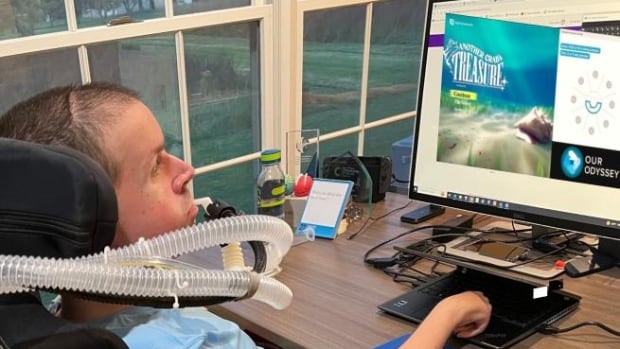
Stacey Button felt unsupported and overworked as a licensed practical nurse in rural Newfoundland, an experience fraught with so much stress and dejection that she left her home and a full-time job to become a travel nurse.
She says she now has job flexibility, is treated with respect and gets paid far more than she did back home.
As well, Button says that if the Newfoundland and Labrador government doesn’t make major changes to the public health system, it will be challenging to persuade many other nurses to stay in Newfoundland and Labrador.
“You can’t have it both. You can’t expect people to do this crazy hard job and then also try to rein them in and, like, squeeze them as tight as you can,” said Button.
“Health care needs nurses more than nurses need to work here.”
A Globe and Mail report in February revealed that the provincial government spent $36.5 million on nurses from private agencies within months, and shelled out cash for travel nurses’ training, cable bills and a variety of other expenses.
Newfoundland and Labrador Health Minister Tom Osborne has called travel nurses a “necessary evil” on numerous occasions, and has said there are full-time nursing jobs for every nurse in the province, but that nurses should temper their expectations because the available jobs may not be in the specific units or locations they want.
Button says the province is aware it has a nursing problem, and is choosing to blame it on nurses.
“You can’t, you know, say we don’t want agency nurses, that they’re the worst. And then also be like, well, we’re also not going to give our home nurses anything that they’re asking for, so they’re the worst,” said Button.
Overworked and underappreciated
Around 10 years ago, Button moved with her husband and three dogs to take a permanent, full-time position at a hospital in Springdale, near Green Bay, in central Newfoundland. She previously worked as an LPN for a year in her hometown of Corner Brook.
In Springdale, she says she worked mostly in a nine-bed acute care ward, and was the only LPN working alongside one registered nurse on overnight shifts.
Stacey Button left her full-time job as a licensed practical nurse in Springdale, N.L., to become a travel nurse, after what she says was around 10 years of feeling overworked and underappreciated. She says the provincial government is deflecting blame by calling travel nurses a ‘necessary evil.’
Although LPNs have a different scope of practice and schooling requirements from registered nurses, Button says she was expected to complete the same tasks as her RN counterpart. She says the two of them had to do everything, from patient admissions to helping in the emergency room.
According to the Newfoundland and Labrador Association of Public and Private Employees, which represents around 2,000 LPNs in the province, the maximum amount registered nurses can make is $71 an hour, while LPNs make around $32 an hour — less than half of an RN’s top salary.
Health care needs nurses more than nurses need to work here.– Stacey Button
“If you walked into the nursing station, you wouldn’t be able to tell who was who,” said Button. “And yet you’re looking at someone who’s making almost double what you’re making.”
Button says she worked 12-hour shifts for seven days within a two-week period, but says she was asked to work overtime almost every day she had off. Button says the hospital was understaffed, so she was often overwhelmed with work and received little support from management.
“I just think that people want three things from their job, right?” said Button. “They want respect, they want flexibility and they want to feel like they’re being paid what they’re worth. And I just didn’t feel any of that here.”

Button decided to become a travel nurse in the summer of 2023. Shortly after she left, she found out she was replaced by a travel RN.
In an emailed statement to CBC News, N.L. Health Services spokesperson Mikaela Etchegary said there are travel RNs working in both the emergency department and the long-term care facility in Springdale.
Button says it’s well-known in the travel nursing community that taking a stint in Newfoundland and Labrador is lucrative — something she feels is ironic, because she says the same system that’s rewarding travel nurses is shoving out those who already live and work there.
“It’s very disheartening,” said Button. “As a travel nurse, I feel like I’m being paid what I’m worth for the amount of work I did.”
Making what you’re worth
NAPE president Jerry Earle, whose union represents about 2,000 LPNs, says the scope of practice expected from LPNs has changed significantly over the last five to six years, but the amount they’re paid hasn’t kept pace.
He says the union has taken this issue to the provincial government, and says the health authority has agreed to conduct a review into LPN scope of practice and how it correlates with compensation.
In an emailed statement to CBC News, Department of Health and Community Services spokesperson Tina Coffey said the provincial government signed a memorandum of understanding with NAPE and the Canadian Union of Public Employees. The MOU includes $2.48 to $3.11 per hour on top of what LPNs are currently making, as well as a five per cent increase for LPNs with 15 to 25 years of service in the province.
Earle says private nursing agencies are preying on vulnerable and overworked nurses, as well as a strained health-care system, bleeding the province of millions of dollars that should be invested into itself, as opposed to a private company.

“We have had a number of practical nurses and other health-care workers reach out to us and say, we would return to the system if things were better,” said Earle.
“Things have to get better. We can’t have people working 24 hour shifts and working days off, not able to get annual leave. That can’t continue and that has to be addressed.”
Button says travel nursing has been life-changing. She has travelled to Nova Scotia with a close friend and is hoping to go to Nunavut this summer, all while being able to better support herself and her family. She also says she’s finally able to enjoy her days off, uninterrupted by calls to work overtime.
She misses her dogs and her husband in Springdale, and says she loves the town and many of the colleagues and managers she worked with. But the pressure of working in a health-care system that’s so understaffed it seems to be falling apart at the seams, Button says moving home right now isn’t worth it.
“I just think nursing in this province is not a place, not a thing I want to be a part of at the moment,” she said.
“And the pay is not great and the government doesn’t seem to be taking anybody seriously. I feel like I’m helping my family financially more by being a travel nurse than I ever could being a staff nurse here.”
Download our free CBC News app to sign up for push alerts for CBC Newfoundland and Labrador. Click here to visit our landing page.








